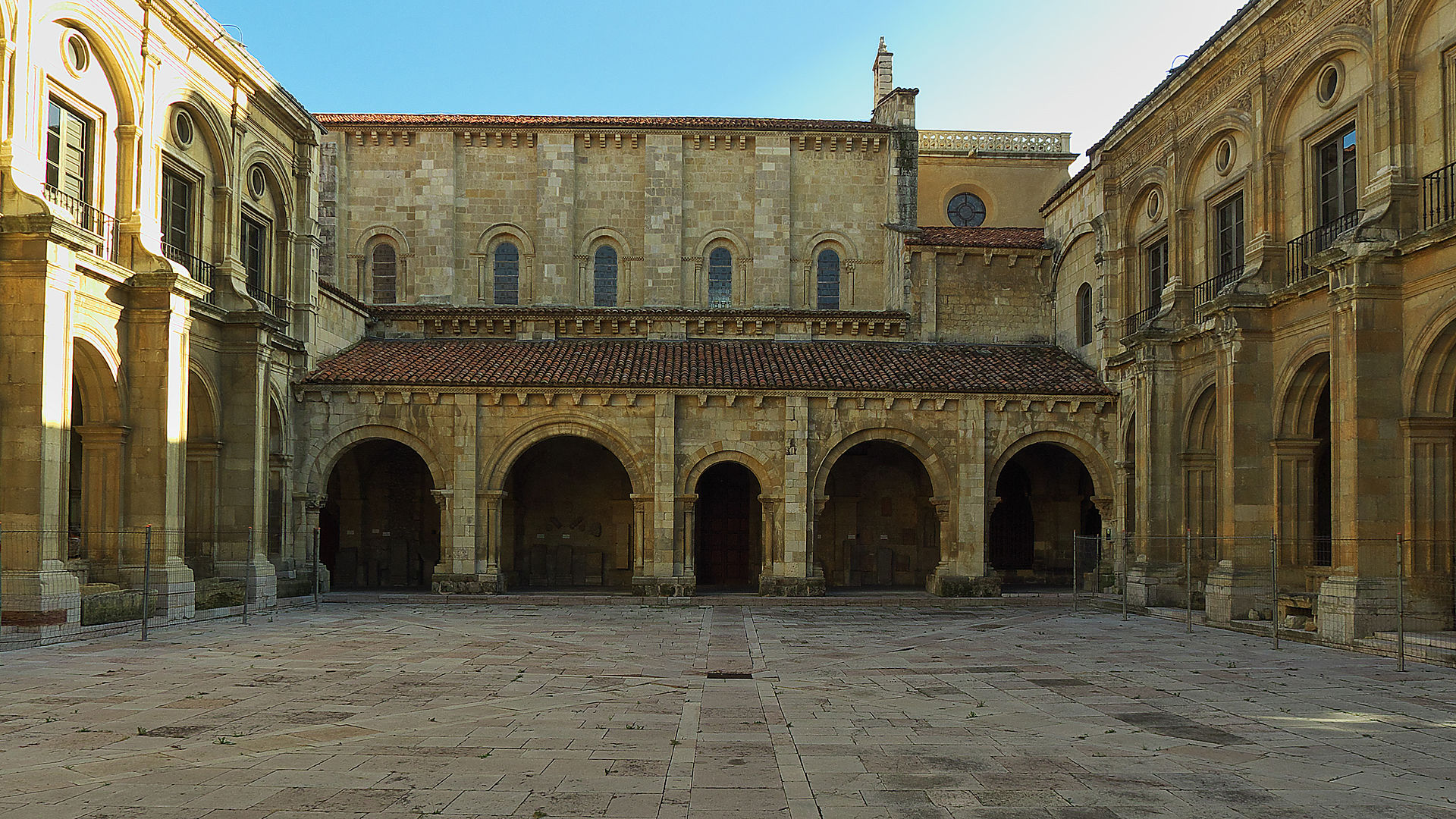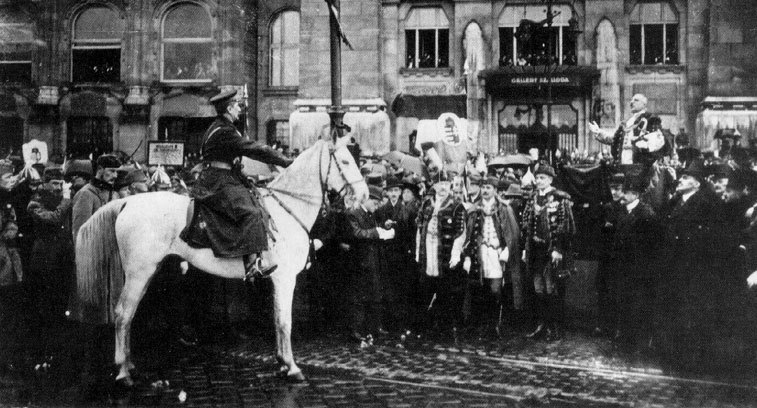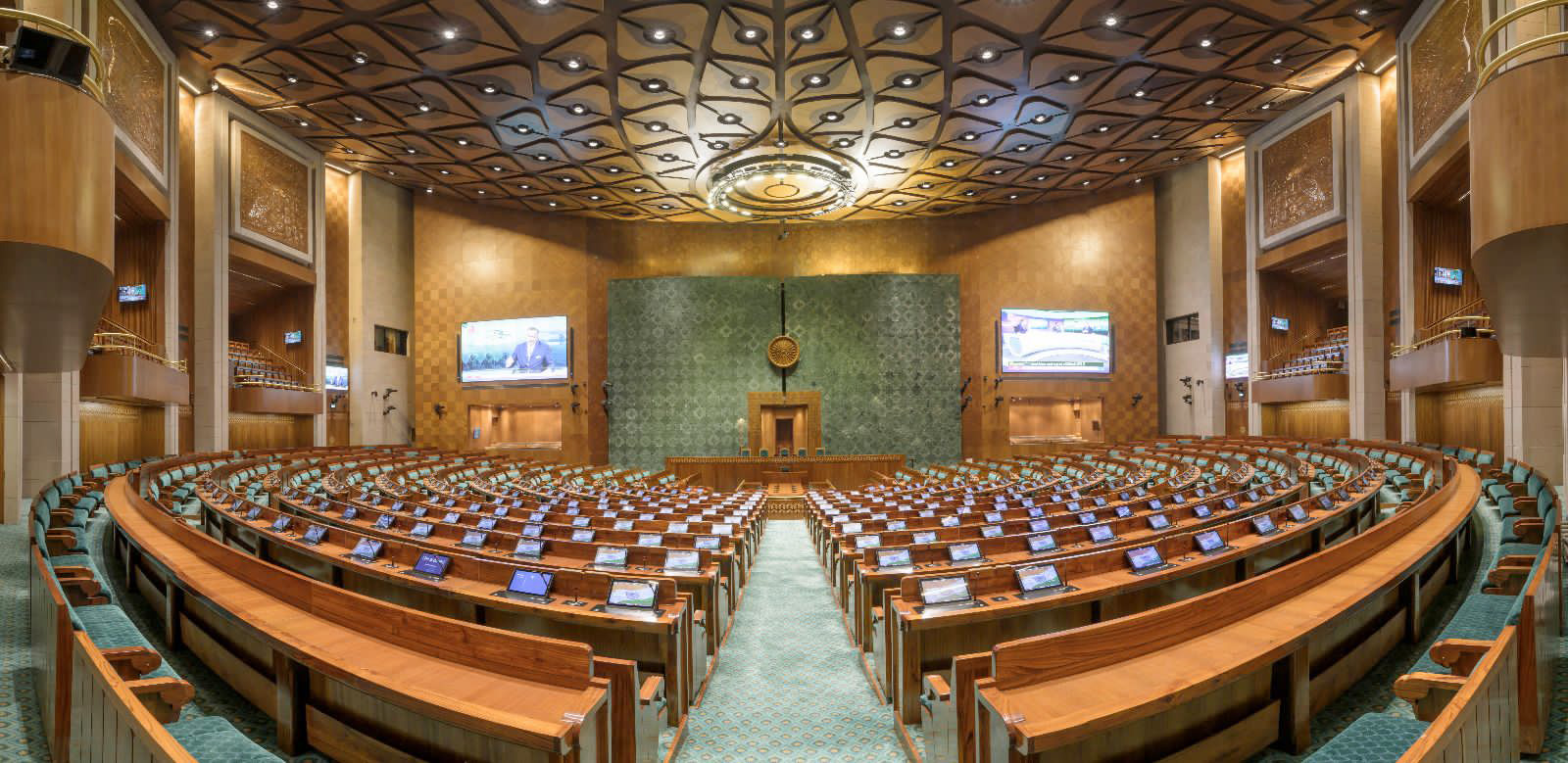Why Parliaments?
The original assembly in 12th century Spain was not a space for popular democracy, but for tough bargaining and long distance government. After 800 years of evolution and facing civilizational challenges, parliaments need to further transform to meet the moment and deliver on the promise of inclusion. Can watchdog parliaments gather enough steam to effectively restrain those in power?

The Cloisters of San Isidoro, the place where the first cortes met in León, northern Spain, in 1188 CE. Photo by José Luis Filpo Cabana via Wikimedia Commons.
More than eight centuries ago, in these magnificent sandstone cloisters where we are gathered, a young king convened the world’s first parliament of representatives. The beginning was breathtakingly unexpected, a surprise so startling and precious that later generations jostled to lay claim to its fame.
In England, politicians and historians have long been fond of saying that their House of Commons is the Mother of Parliaments. The ‘little room’ in London’s Palace of Westminster, said Winston Churchill a century ago, serves as ‘the shrine of the World’s liberties’. The parliamentary historian and aspiring Liberal politician A.F. Pollard repeated the claim that parliaments were ‘incomparably the greatest gift of the English people to the civilization of the world’.
My La Vida y Muerte de la Democracia (2018) politely questioned this English prejudice. It showed how, in the spring month of March 1188, in the walled, former Roman town of Léon, a full generation before King John’s Magna Carta of 1215, Alfonso IX did something extraordinary: he invented an instrument of government soon to be called a cortes, or parliament. A place where differences of opinion were freely debated and laws made peacefully based on negotiated agreements among representatives of various social interests drawn from a wide geographic radius.
The remarkable invention came laced with ironies. The cortes was among Europe’s first precious gifts to the world of modern representative democracy, yet the unfashionable word ‘democracy’ played no role in its birth. The world’s first parliament stood for the open acceptance of differences, yet it was a child of recolonization and empire building. Its birth was a moment in the Reconquista, a bitter military struggle of Christians to snatch fields and towns from the Muslims of northern Iberia, to set Spain on a course to become the greatest political power in early modern Europe.
At the epicentre of these ironies stood King Alfonso IX of León (1188 -1230). At the ripe age of seventeen, returning from exile in Portugal, he accepted the crown of a kingdom beset with military, monetary and moral troubles. The young king was inexperienced, wet behind the ears, but he caught his doubters and foes off guard. He sprang a big surprise. Was he the bullfighter so sure of his coming demise that fear lost its grip and courage enabled his fightback? Did exile teach him the art of historical timing, the precious sixth sense of knowing what will work and what won’t work in any given circumstance? Had he been inspired by the royal meeting (curia) convened in neighbouring Castile the year before, when town representatives (maiores) were among the dignitaries who assembled to confirm the right of accession to the throne of Queen Berenguela, whom he later married? We can’t be sure.

Representatives, known as procuradores, at the court of León cortes of 1188. Image courtesy of John Keane.
What’s clear is that Alfonso chose to fight his way out of a tight corner by convening a first-ever meeting with representatives of the leading local estates. Gambling with his crown, making compromises that might have destroyed his kingly powers, young Alfonso IX turned to the local nobility, the warrior aristocrats who were committed in their bones to the reconquest of their lands. He called as well on the bishops of the church, the estate that saw itself as the guardian of souls, and the spiritual protector of God’s lands; and he summoned the citizens of the towns (cives), moneyed ‘good men’ (boni homines) respected for their role as elected officers of the town councils called fueros.
It was from inside this medieval triangle comprising the nobles, bishops and urban citizens – the representatives of soldiers, souls and money – that the modern practice of parliamentary representation was born. It was one of those magical moments when the participants couldn’t possibly have known the world-historical significance of what they were doing.
What happened in Léon wasn’t breaking news. This wasn’t yet the age of breaking news, but the first-ever cortes, as contemporaries soon christened it, radically altered the poetry of politics. It gave a new meaning to the word itself, which until then had been the local term for both the town where a king resides and a city council whose representatives made proposals and demands and granted services to a monarch.
As for the word representation (procurador), there’s an outside chance that locals had absorbed the notion from local Muslims, for whom a legal representative (wākil) was a religious judge chosen by a merchant to act in his stead, for instance handling his lawsuits and acting as the merchant’s banker and postmaster.
The members of the first cortes were certainly familiar with the Latin term procurator. It referred to a man who acts as an agent of another man, with his consent. It referred to someone authorised to appear before a court to defend another person in a lawsuit or dispute. It was used as well to speak of an official (known as the procurador general) who took care of the property and wellbeing of the city, or who acted as a guardian of the interests of the poor (procurador de pobres).
A great refusal
The León parliament transformed the language of politics. It was also a great refusal of divine, absolute monarchy. This cortes was no gathering where monarchs waved the flags of courtly pomp to impress their subjects on bended knee. Against the backdrop of war, the old medieval custom of convening meetings such as the German Hoftage and English witenagemot to swear fealty to a sovereign’s will was cast aside. Tough bargaining among conflicting social interests in the presence of the monarch was the new custom. A parliamentary monarchy was born.
The first parliament was held in the cloisters of the church of San Isidoro, named in honour of the good bishop of Seville famous for his maxim that only those who govern well are true monarchs. It produced up to fifteen decrees (the authenticity of several is disputed) that together amounted to something like a constitutional charter.
The king promised that in matters of war and peace, pacts and treaties he would hereon consult and accept the advice of the bishops, nobles and ‘good men’ of the towns. It was agreed that property and security of residence were inviolable. The representatives accepted that judicial proceedings and the laws they produced would be respected; and that the king’s realm would be guided, wherever possible, by the good customs (mores bonos) and general laws inherited from earlier times – the so-called Book or Liber Iudicorum from the time of the Visigoths. It was also agreed that there would be future assemblies of the king and the estates.
We need to pay attention to the profound historical and political significance of what happened in León. The assembly was the first recorded gathering of all three estates; the interests of the towns had hitherto been ignored in meetings convened by the monarchs of the region. We could say that the surprise inclusion of the towns was the beginning of many centuries of social and political struggle to equalize parliamentary representation – a struggle that’s nowadays still unfinished. But there was more.
This assembly of representatives of the nobility, church and towns promised a new way of governing. The cortes method of handling power supposed that guarantees of fair play could foster political deals among conflicting interests, thus avoiding the use of naked force. In striking contrast, say, to ancient Athens, where citizens feared division and supposed that democracy required a unified sense of political community, the cortes rested on the opposite precept: on the inevitability of competing and conflicting interests. And, for the sake of the common good, the desirability of forging peaceful compromises among them.
Putting things more abstractly, we could say that the cortes redefined politics in four ways. Its embrace of representation had insurgent, disruptive effects. It sharpened people’s sense of the contingency or alterability of power relations. The cortes questioned arbitrary power. It radicalised the old feudal notion of the contractual right of vassals to resist unjust treatment by their overlords. The cortes encouraged representatives to muster the courage to tell the king to go to hell.
Well before the age of party politics, the cortes also underlined the point that representatives don’t necessarily share the same realities and that parliaments are therefore spaces in which reality itself becomes contestable and negotiable. The cortes anticipated Cervantes. It destroyed the metaphysics of reality: within its walls, representatives affirmed that things always have at least two sides- that the windmills of hard reality are inescapably shaped by interpretations that lend them significance.
But the cortes had a third important effect: it offered the possibility of turning disagreements about reality into binding agreements in support of a common good. During these years, Spain was not yet a country. It was very much an invertebrate polity, to use the words of Ortega y Gasset, a space paralysed by social divisions, rebellions and threats of war. The cortes offered a positive alternative: combining social divisions into a more integrated polity, supported by people with straightened spines; a people bound together by their reliance upon parliamentary negotiations and agreed laws backed by the king.
Finally, the cortes created the space for long-distance government. It widened its footprint. It improved the chances of reaching workable agreements among otherwise mutually hostile groups by limiting the numbers of decision makers, some of whom were required to travel great distances.
The cortes showed that representative governments could rule their subjects at arm’s length without losing their trust and consent. The government of large territories was possible exactly because the representatives involved in making decisions were entitled to snap at the heels of the monarch, to defend their respective interests in his presence.
Laboratories atop a graveyard
What about the subsequent fate of the cortes of León? Encouraged by military victories over the Moors, the surviving evidence shows that the cortes managed to survive for several centuries. Long distance government based on the consent of its subjects worked.
By the end of the fourteenth century, following a merger of the neighbouring kingdoms of León and Castile, the kingdom’s representatives enjoyed considerable powers. Their right of gathering and presenting petitions, and their insistence that agreements struck by the parliament were legally binding, became customary.
Constitutional monarchy produced plenty of strife. The cortes was the site of intense bargaining about definitions of the welfare of the realm. Money was often the key cause of friction. Representatives constantly emphasized that kings were forbidden from manipulating coinage or levying extraordinary taxes without the explicit consent of all the estates. Before the end of the fourteenth century, there were times when the cortes reportedly demanded an audit of the court’s expenditure, even rebates on taxes that had already been paid.
The new León style of government proved geographically infectious. During the thirteenth century, parliaments spread from León and Castile to Aragon, Catalonia, Valencia and Navarre, to Sicily and Portugal, England and Ireland, and across the empires of Austria and Brandenburg. During the next two centuries, parliaments appeared in the large majority of German principalities, in Scotland, Denmark, Sweden, France, the Netherlands, Poland and Hungary.
Nearly all these late medieval and early modern parliaments survived until the seventeenth and early eighteenth centuries. Despite the growth of absolutist states, which crushed the assemblies of Aragon, Catalonia and Valencia, many continued to function until the irruption of the French Revolution in 1789. The Navarrese cortes, the Swedish Riksdag and the Hungarian Diéta lasted into the nineteenth century. The powerful Estates of the Duchy of Mecklenburg survived intact until 1918.
By that time, in the aftermath of the collapse of empires and a catastrophic world war, Europe, noted Tomáš Masaryk, had become ‘a laboratory atop a vast graveyard’, a laboratory of democracy in which most European parliaments were besieged by political parties, trade unions, suffragists and other citizens demanding universal suffrage.
Many observers expected the dawn of parliamentary democracy, but as we know, the cruel opposite happened. The butterfly of parliamentary democracy became the caterpillar of arbitrary rule. The long democratic revolution unleashed by young King Alfonso IX had run its course.
Here’s another irony: just as ‘the people’ mounted the stage of history, demanding ‘one person, one vote’, parliaments were racked by factional disputes, fierce backlashes and acts of violent sabotage. In countries like Yugoslavia and Romania, monarchs strangled parliaments. Military-backed dictators also savaged their parliaments, as happened in Piłsudski’s Poland and Horthy’s Hungary. Totalitarian rule triumphed in Italy, Germany, Russia and Spain, and also in China, which might otherwise have become the world’s largest parliamentary republic.

Admiral Miklós Horthy being greeted by Budapest city officials on 16 November 1919. This day marked his takeover of power in post-WWI Hungary, just established as a sovereign country upon the dissolution of the Habsburg Monarchy. Horthy ruled continuously until 1944. Photo via Wikimedia Commons.
During these first decades of the 20th century, the downfall and disappearance of parliaments gathered pace. Politicians dressed in frock coats and top hats grew scared. The spirit of ‘dead bourgeois parliamentarism’ (Lenin) fractured and paralyzed parliaments. Governments rose and fell in quick succession.
In Portugal, whose first 15 years of republican government had been marred by dozens of governments, eight presidents and countless attempted coups, the words of the new dictator Salazar blew like a winter wind across the whole continent, and well beyond. ‘So long as there is not some retrograde movement in political evolution,’ he said in 1934, ‘I am convinced that within 20 years there will be no legislative assemblies left in Europe.’
Rump parliaments
Salazar’s wishful prediction almost came true. By 1941, there were only 11 parliamentary democracies left on our planet. Only three survived in Europe: Britain, Sweden, and Switzerland.
Historians and political scientists tell us the good news that after World War Two parliamentary government made a stupendous political comeback. The not-so-good news is that the long post-1945 renaissance of parliaments is today losing momentum.
There’s writing on the walls of parliaments. We’re living through times in which parliaments are again plagued by legitimacy and performance problems. We need to pay special attention to this new trend.
We aren’t backsliding to former times, say, to the catastrophes of the 1920s and 1930s. We aren’t even facing the kind of overnight emergencies that gripped Spain on February 23rd 1981 –the moment described with great precision in Javier Cercas’s Anatomía de un instante when, in a hail of bullets, a frightened Cortes fell to the floor and was held hostage for six hours by golpistas.
More recent events in Bolivia, Burkina Faso, Mali, Myanmar, Sudan, Thailand and Yemen suggest that armies are still enemies of parliaments, but the main forces threatening the integrity of parliaments are nowadays different. They seem more banal. Their rhythm is different. But these new threats, if left untreated, are bound in the long run to destroy parliaments as effectively as happened a century ago in the heartlands of Europe.
What are these new sources of ruination? Most obviously, rising tides of reputational damage are lapping around parliament’s doorsteps. Cynicism, grumbling, ressentiment and angry citizens’ protests are becoming commonplace. On an already overheated planet, parliaments are said to be hot air chambers, mere talk shops, fabricators of unreality, quarrelsome kindergartens, warehouses of division, irrelevance and incompetence. Parliaments are the butt of bitter jokes. My Irish working class father – who knew something of the 1605 Gunpowder Treason Plot by supporters of Catholic Spain to blow up England’s House of Lords – liked to say that only one man ever entered parliament with honest intentions, and that was Guy Fawkes.
Tomfoolery and contempt for politicians hurt and harm parliaments from the outside, but just as worrying are the forces of decadence within the walls of parliaments. There’s not just the grandstanding, slam-bang rancour, misogyny and cluelessness of more than a few politicians. Or the ‘dead hand of party discipline’, as Michael Ignatieff put it.
Parliaments are materially corrupted by the combined forces of lobbyists, dark money merchants and revolving doors. In Washington DC, this tangled complex of government agencies, think tanks, corporations, academics and lobbyists with big toes in the lawmaking world of legislatures is known (for obvious reasons) as ‘the blob’.
Something similar is happening in the European Union where, in Brussels alone, nearly 12,000 organizations on the current voluntary EU lobby register declare that each year they spend a total of around 1.8 billion euros on their craft. At least 7,500 organizations operate without scrutiny in and around the European Parliament.
Whatever is thought of the ethics of lobbying, the fact is government by moonlight is a growing problem in every parliamentary democracy. Mandatory accountability registers and comprehensive integrity checks to prevent ‘Qatargate’ corruption scandals and to ensure ethical fair play among lobbyists are typically in short supply.
India’s lower chamber Lok Sabha is the nightmare instance of what happens when lobbying, dirty money, shady deals, blackmail and criminality get the upper hand. In what’s known as the world’s largest democracy, more money is spent on elections than in the United States, even though average per capita income is only 3 per cent of US levels.
There’s no state funding for political parties and no proper regulation of party finances. 75 per cent of party funding comes from ‘unknown’ sources, including tax-free electoral bonds bought from the state-owned Bank of India (SBI) and anonymously deposited into the parties’ registered bank accounts. An estimated one-quarter of total election campaign expenditure goes directly to voters as cash and gifts.
The upshot is that in Modi’s India parliament becomes a place of business deals, organised crime and ‘resort politics’ (an Indian specialty: party bosses buying off recalcitrant lawmakers in luxury hotel hideaways). Following the 2019 elections, unsurprisingly, 43 per cent of MPs in the directly elected Lok Sabha had declared criminal cases against them (self-declaration is an election rule); 29 per cent confessed to ‘serious’ criminal charges, which include murder, attempted murder, kidnapping, rape and other crimes against women.

Opened in May 2023, Narendra Modi calls the new parliament a ‘temple of democracy’. Photo By Ministry of Parliamentary Affairs of India via Wikimedia Commons.
The Indian case shows how, in the name of democracy, parliaments can slowly degrade into mere meetings of more or less corrupted souls. The old saying that the word politics comes from poly, meaning many, and ticks, meaning bloodsucking parasites, then applies with a cruel vengeance.
The decadence is perfected when parliaments fall victim to executive capture, to what Thomas Jefferson originally called ‘elective despotism’. In more than a few of today’s democracies, the centre of gravity of government is shifting from parliaments towards media-spun presidential rule. Take note how growing numbers of political oligarchs do everything they can to prorogue their parliaments, take decisions without consultation, all the while ignoring calls for accountability. They boast, contradict themselves and lie with impunity. Their media performances are reality shows. Excrement without nutrient – commonly called bullshit – is their specialty.
When this colonization of parliaments happens, the spirit of the Léon cortes is replaced by the mantra of Charles de Gaulle: that politics is much too serious a matter to be left to time-wasting, dithering politicians. The trend resembles a slow-motion coup d’état. It is backed by tactics such as government whipping, gag orders, gerrymandering and voter deregistration, emergency rule, compulsory budget limits, and the punishment of dissenting members. There are also kickbacks and favours and, lest we underestimate, sly efforts to outflank parliaments and silence their committees with the help of hand-picked, loyal bureaucrats, journalists, judges and other high officials, as Donald J. Trump attempted during his post-2016 presidency.
Things grow worse when populist parties and their demagogues get their paws on the levers of government. Populism accelerates the transition to elective despotism. Populists like Erdoğan, Kais Saied, Vučić, López Obrador and Kaczyński favour executive rule. They have a taste for prorogued legislatures, or what the English used to call rump parliaments: chambers that resemble chunks of rotting meat infected with maggots, parliamentary representatives who in the name of the people do little more than serve their executive masters on bended knees.
Things grow much worse when populist governments de-regulate, privatize and commodify public services. When neo-liberalism gets the upper hand, parliaments are blindsided. They become complicit in the growth of what should be called democracy exclusion zones: self-regulating banks, lawless tax havens, secret military-industrial complexes, and buccaneer data-harvesting media corporations which elude parliamentary scrutiny and legislative restraint.
Fightbacks
So what of the future of parliaments? Do they have a future? When thinking about these various decadent trends, it’s tempting to conclude that the post-1945 renaissance of parliaments is coming to an end. We may even think that we’re already entering the age of phantom parliaments in which legislatures in more than a few countries are simultaneously real and not real, form without much content. In these make-believe spaces, elected representatives claim to serve the people, even though they are of limited or no significance to the people in whose name they pass laws.
A shift to phantom parliaments and executive rule may be welcomed in some quarters, but before the cava is poured, let’s consider the countertrends, and the reasons why, in these years of the 21st century, the cortes model of government remains indispensable.
In politics, nothing is set in stone. To speak in quantum terms, contemporary parliaments are in a state of superposition. Just as the fate of Schrödinger’s cat in a box was undecidable, so are parliaments today suspended unpredictably between alternative outcomes. Fightbacks are possible. They are necessary. Remarkably, renewals are happening at multiple points on our planet.
Consider Denmark’s Folketinget: in meetings called consultations (samråd), its powerful European Affairs Committee regularly grills ministers in real-time during sessions of the Council of the European Union in Brussels and Luxembourg. The National Assembly of the Republic of Korea has signed off on the world’s first comprehensive laws against verbal abuse and bullying (‘gapjil’) by family-run conglomerates and other powerful organisations. Romania’s parliament is now digitally fed citizens’ suggestions and complaints with the help of ION, a smart robot, say the wags, designed to improve the ‘intelligence’ of politicians. Proposals are afoot in the German Bundestag to receive non-binding reports from lottery-selected citizens’ assemblies.
Parliaments are also heavily preoccupied with time past and time future. The Welsh legislature regularly consults with the world’s first Future Generations Commissioner. With eyes on the unmade future, the European Parliament has drafted the world’s first AI Act. New Zealand’s (Aotearoa’s) parliament has granted ecosystems ‘the rights, powers, duties and liabilities of a legal person’. The cross-border Nordic network of Sami parliaments, the Sámediggi is a case of interparliamentary cooperation, featuring consultative bodies whose brief is to promote and preserve indigenous self-determination.

The Sámediggi has represented the indigenous people, the Sámi of Norway, since 1989. Image by Hanne Holmgren via Wikimedia Commons.
Watchdog parliaments
How are we to make good sense of this new wave of experiments? My suggestion is to see them as points on a larger canvas, single performances in a grand carnival of parliamentary efforts to rejuvenate the cortes spirit.
Shadows are certainly falling on too many of the world’s parliaments. But these innovations are the first signs of a dawn of renewal. They breathe new life into old institutions originally designed to make binding agreements by lawmakers acting on behalf of different social interests, in the name of the commonweal. More obviously, these parliamentary experiments are today doing what parliaments did for over eight centuries: representing the claims and interests of the represented – and they remind us that parliamentary representation is, by definition, tricky business.
Populists and demagogues be warned: representation isn’t a simple, face-to-face contract between a representative and an imaginary People or Nation. Representation isn’t mimesis. It has a vicarious, fiduciary quality, and this means that when voters choose a representative, representation is as much an ending as it is a beginning. Representation is an open-ended process contingent upon the assent, disappointment and displeasure of the represented. When representatives underperform, or fail on too many fronts, they are sent to hell in a handbasket.
These principles of representation, traceable to the Léon cortes convened by Alfonso IX, are most definitely alive and kicking in the new parliamentary experiments. That’s why textbooks still tell us that the prime task of parliaments is to represent the interests of citizens by means of free and fair elections. But there’s an error within the textbooks: if we look more closely at what today’s smart, activist parliaments are actually doing, we see a departure of great historical significance ignored by the textbooks.
Parliaments aren’t just chambers or ‘little rooms’ where elected politicians represent their constituents. In our age of monitory democracy, legislatures are becoming watchdog parliaments. In the name of the common good, they blow whistles, sound alarms, warn of wicked problems and pass laws to push back or ban arbitrary exercises of power.
The contrast with parliaments of yesteryear couldn’t be clearer. The first-ever cortes was born of military conquest. Parliaments of the more recent past were too often the castles of the aristocracy, bourgeois mansions, parlours of male privilege, and engines of empire. By contrast, today’s watchdog parliaments, when they work well, stand against conquest in all its various forms. Especially when generously resourced, watchdog parliaments specialise in the public scrutiny and restraint of predatory power. They stand against foolish governments that abuse their power.
Watchdog parliaments snap the chains of majority rule, the blind worship of numbers, by granting voices and rights to minorities excluded from high politics. These parliaments alter our shared sense of time. They extend the franchise to endangered species, wronged ancestors and future generations. In opposition, say, to predatory corporations, greedy banks and rogue mining companies, watchdog parliaments protect and promote the rules of the democratic game. Not to be underestimated is the way they strive to tackle long-term problems, currently sidelined by the short-term mentality of election cycles.
Watchdog parliaments are more than the guardians of electoral integrity. As champions of the public monitoring of power, they target complex, difficult, wicked problems. Their job is to find just solutions for matters such as artificial intelligence, tax havens, polluted environments, pestilences, the plight of stateless peoples, the unregulated arms trade and unending wars of attrition.
When performing these functions, paradoxically, watchdog parliaments push beyond the ‘parliamentary road’ and the fetish of periodic elections. They help redefine democracy and give it teeth. Electoral democracy becomes monitory democracy. Democracy comes to mean nothing less than free and fair elections, but also something much more: citizens’ freedom from predatory power in all its ugly forms, including our reckless relationship with the Earth on which we dwell.
True, the new watchdog parliaments are fragile. They function without much intellectual support. No grand political theories of the order of François Guizot’s lectures on the origins of representative government in the early 1820s, or John Stuart Mill’s Considerations on Representative Government (1861) have come to their defence. They lack guidebooks and operating manuals. This is to say that watchdog parliaments enjoy no scholarly fanfare and no historical guarantees of success. Except to future historians, their chances of survival are unknown.
The only thing that’s certain is that the spirit of these watchdog parliaments – the spirit of young King Alfonso IX – is the grit we humans are going to need as we struggle to deal wisely, equitably, and democratically with the rich opportunities and cascading dangers of our troubled century.
This article is based on the author’s keynote address, delivered in the presence of King Felipe VI, at the conference to commemorate the International Day of Parliamentarism hosted by the Inter Pares: EU Global Project to Strengthen the Capacity of Parliaments (Cortes Generales, Léon, Spain, June 30, 2023)
Published 7 August 2023
Original in English
First published by Eurozine
© John Keane / Eurozine
PDF/PRINTIn collaboration with
In focal points
- Living dead democracy
- Why Parliaments?
- Spelling out a law for nature
- No more turning a blind eye
- The end of Tunisia’s spring?
- Protecting nature, empowering people
- Albania: Obstructed democracy
- Romania: Propaganda into votes
- The myth of sudden death
- Hungary: From housing justice to municipal opposition
Newsletter
Subscribe to know what’s worth thinking about.
Related Articles

Viewing authoritarianism as a political trend overlooks the damage it can cause. The devastation ‘illiberal democracies’ are inflicting on cultural and media sectors show just how difficult it is to recreate something once it has been taken apart. Eurozine partners discuss ways to sustain journalism at the 32nd European Meeting of Cultural Journals.

Back on the Trump track
Topical: US Election
War, women’s rights, deportations and democracy: what’s at risk as Trump returns? Eurozine’s topical reads on what to expect of the power shift in the US.






